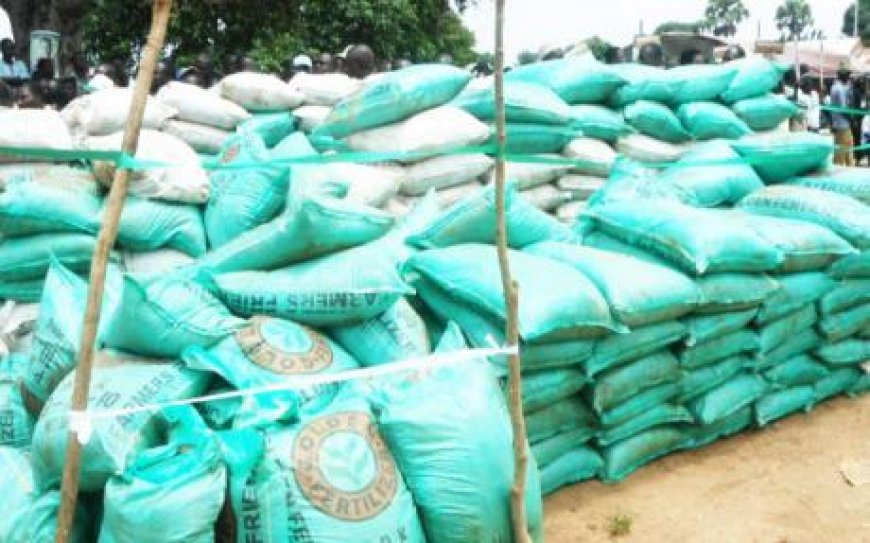Nigeria imports 560,000 tonnes of fertiliser inputs in 2025

The Ministry of Finance Incorporated has disclosed that Nigeria imported more than 560,000 metric tonnes of fertiliser raw materials in 2025 alone, underscoring the Federal Government’s determination to guarantee steady access to agricultural inputs under the Presidential Fertiliser Initiative.
In a statement released on Wednesday, MOFI explained that at least 10 vessels had already discharged or were expected to discharge fertiliser raw material cargoes at Nigerian ports this year. The agency stressed that the continued inflow of inputs was building a strong foundation for robust local production while assuring uninterrupted supply and stability across Nigeria’s fertiliser value chain.
“New data confirms steady progress. From 2022 to date in 2025, 48 distinct vessels have delivered critical raw materials for fertiliser blending under the PFI. In 2025 alone, 10 vessels have already been discharged and are expected to discharge cargoes, accounting for more than 560,000 metric tonnes of inputs received at Nigerian ports,” the statement read.
The agency emphasised that the initiative was directly aligned with President Bola Tinubu’s vision for food sovereignty, which prioritises not just production volumes but also resilience in the supply chain. According to MOFI, ensuring that blending plants have consistent access to raw materials has boosted confidence among farmers and industry stakeholders.
The statement noted that the PFI, described as a cornerstone of Nigeria’s food security strategy, has now entered a new phase tagged PFI 3.0. The focus of this stage is to lay a solid foundation for the continuous supply of raw materials to blending plants across the country, with the broader objective of making Nigeria self-sufficient in crop production for both food and industrial purposes.
“As of September 2025, more raw materials have already been supplied or ordered than the total supplied in 2024, and additional arrangements have been concluded with fertiliser raw material manufacturers to stock warehouses nationwide,” the agency said.
Blending plants, it added, will have access to as much raw material as their production capacities can handle. This assurance is backed by verifiable supply data and the proven track record of the PFI, which has built confidence among farmers and investors in Nigeria’s agricultural sector.
MOFI’s Managing Director and Chief Executive Officer, Dr Armstrong Takang, described the PFI as a model of effective public–private collaboration capable of addressing complex national challenges.
“We are meticulously building a system that can insulate farmers from global market shocks and instil the confidence needed for long-term agricultural planning. We see the PFI as a prime example of public–private collaboration that can solve complex national challenges, and its future is a testament to Nigeria’s capacity for strategic reform,” he said.
Since its inception in 2016, the Presidential Fertiliser Initiative has been central to Nigeria’s food security drive. Between 2021 and 2024 alone, more than 4.5 million metric tonnes of finished fertiliser were produced under the scheme. Cumulatively, the programme has delivered over 128 million bags of fertiliser directly to farmers.
The Fertiliser Producers and Suppliers Association of Nigeria also highlighted the remarkable growth in local blending capacity under the initiative. According to its President, Sadiq Kassim, the number of operational blending plants has expanded to more than 90 nationwide, with a combined blending capacity of up to 13 million metric tonnes.
“This capacity is a critical asset in ensuring fertiliser is consistently available for our farmers, bringing it closer to their farms and reducing transportation costs,” Kassim said. Industry experts maintain that the expansion of blending capacity has been instrumental in strengthening Nigeria’s fertiliser value chain, reducing dependence on imports, and creating jobs across multiple states.
Despite the stability of supply, the statement acknowledged that farmers continue to face challenges, particularly rising prices of fertiliser in recent seasons. Industry leaders attributed these price pressures to foreign exchange volatility and global raw material costs, rather than domestic scarcity.
“Although the supply is robust, industry leaders acknowledge farmers’ concerns regarding rising prices in recent seasons. They clarify that these pressures are a direct result of foreign exchange volatility and global raw material costs, not local scarcity,” the statement added.
To cushion farmers from these external shocks, the Federal Government is preparing for the third phase of the PFI, which was endorsed during the August 2025 Stakeholder Roundtable in Abuja.
The PUNCH had earlier reported that the Ministry of Finance Incorporated is set to assume operational control of the PFI from the Nigeria Sovereign Investment Authority, which had managed the programme for nearly a decade. MOFI confirmed that it would take over from November 2025, marking the start of a reformed phase designed to improve cost efficiency, strengthen traceability, and ensure year-round nationwide availability of fertiliser.
The statement explained that these reforms would also help address hoarding and diversion of fertiliser, two issues that have occasionally disrupted distribution to farmers in the past.
Launched in 2016, the Presidential Fertiliser Initiative has revitalised Nigeria’s fertiliser blending industry, which had previously suffered years of neglect. Beyond fertiliser supply, the programme has created thousands of jobs, revived dormant plants, and strengthened the entire agricultural value chain.
With the unveiling of PFI 3.0 and MOFI’s assumption of management responsibilities, stakeholders say the initiative is entering a decisive stage aimed at securing Nigeria’s long-term food sovereignty.
Nigeria Imports 560,000 Tonnes of Fertilizer in 2025 Boostin









